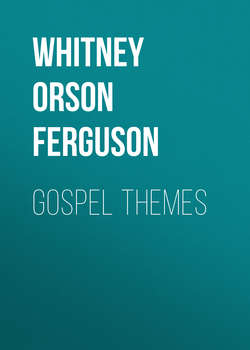Читать книгу Gospel Themes - Whitney Orson Ferguson - Страница 3
The Story of God
CHAPTER II
ОглавлениеEternal Nature of Gospel Principles
Gospel Code and Fundamentals.—The gospel, as a code or System of laws and ordinances, is a creation, a work of God; but like all other creations it was organized out of materials already existing. "Intelligence or the light of truth was not created or made, neither indeed can be (D&C 93:29). Truth, "eternal, unchanged, evermore"—such is the gospel in its fundamental principles. These were never created. God did not make them; he "instituted" them, recognizing their worth, their utility, their adaptability to the purposes which he had in view. He saw that these principles were ennobling and exalting in their nature and tendency, and he therefore created a plan embodying them as the most effectual means for man's promotion.
Faith.—Take, for instance, faith—the first principle. Can you conceive of its creation as a principle? I cannot: but I can grasp the idea of its existence as a law, as an essential force, its adoption by divine wisdom, and its adaptation to the purposes of Deity. I can conceive of its bestowal upon man as an endowment from God, its assimilation, cultivation, growth and increase, as illustrated in the Book of Mormon, where it is compared to a seed germinating in the soul (Alma 32:28). But I cannot think of it, in its essential, fundamental nature, as having been called into existence. Faith is a gift from God, both as a law and a manifestation of spiritual power: but it is not a creation—not as a basic principle. The gospel code containing this law, however, may readily be conceived as the work of a divine Creator and Law-giver.
Repentance.—What is true of faith in this respect, is true also of repentance. God did not create repentance as a principle; it already existed as an essential to progress; but he made it obligatory upon sinful man, if he would be saved and put upon the road to perfection, to practice this principle—to turn away from evil and "sin no more."
Baptism.—As for baptism, the idea of washing in order to be come clean is plain enough for a child's comprehension. It is this idea that underlies the baptismal ordinance. God did not create the fact that washing maketh clean—that is fundamental; but he instituted baptism for the remission of sins and made it a part of the gospel plan, because no unclean thing can enter into the kingdom of heaven.
Holy Ghost.—Divine Wisdom did not create the Holy Ghost: he is eternal, without beginning or end—he is God. Nor did it decree light necessary to illumination; that is a self-evident, self-existent truth. But Divine Wisdom instituted the laying on of hands for the gift (giving) of the Holy Ghost, and included it in the great progressive plan, because, without the illumination that comes from the Spirit of the Lord, man cannot be "led into all truth."
Thus we might go on, taking up other features of the gospel, and in each one pointing out some underlying principle upon which this law or that ordinance has been based. The same philosophy will apply to them all. These fundamental principles are not creations—they are eternal truths, applied or adapted to ends foreseen and predestined by the all-wise Ordainer and Giver.
The gospel was instituted for the advancement of God's children, who had probably progressed as far as they could in the spirit at that time, before they were given bodies; and it was made effective for their further progress by the Atonement of Christ, offsetting the fall of Adam, and nullifying the deadly effects of the original transgression.
The Fall.—Right here let me suggest that Adam's transgression, while technically a sin, because of the broken law, should be stressed as the means whereby those spirits obtained their bodies, rather than as an act of moral turpitude. In law, crimes are of two general classes—malum per se and malum prohibitum. Malum per se means "an evil in itself"—an act essentially wrong; while malum prohibitum signifies "that which is wrong because forbidden by law." Adam's transgression was malum prohibitum, and the consequent descent from an immortal to a mortal condition was "THE FALL."
A Prearranged Plan.—It is evident from the revelations of God, particularly in modern times, that everything connected with man's mortal pilgrimage was understood and arranged before that pilgrimage began. Not alone was the gospel instituted: an executor was appointed to put it into effect. In other words, the machinery was constructed, and the power then turned on. The fall being foreseen, the redemption was ordained. Eternal progress and everlasting glory were the objects in view, and over the glad prospect, in spite of the pain and sorrow that must necessarily intervene, "the Morning Stars sang together, and all the Sons of God shouted for joy" (Job 38:7).
